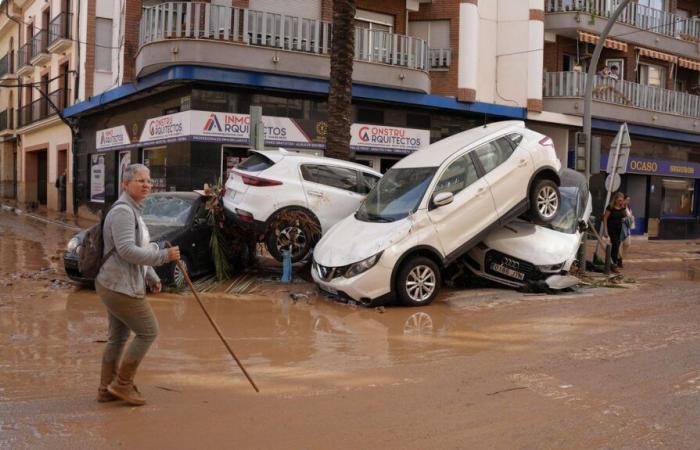Were the alerts on the phones sent way too late? In the Spanish region of Valencia, residents are healing the wounds of this disaster which killed at least 158 people. While the search for the missing continues, in the town of Paiporta, one of the most affected, the victims are trying to understand how such a tragedy could not have been anticipated.
Txelo and José Enrique, two residents of Paiporta whose house has been inaccessible since the floods, express their distress. With bags on their backs, they walk towards downtown Valencia to take refuge with relatives, with their clothes partly covered in mud. They are exhausted, but also angry. The phones received an alert message on Tuesday, at 8:10 p.m., much too late according to Txelo: “The alarms sounded when we already had water everywhere. We had already saved a woman with her two babies, a man locked in his car,” she explains, with a certain emotion. “That's when the civil protection alarms sounded. They sounded all night on Tuesday. But it was too late, especially for all the elderly people in the retirement home. No one 'survived there.'
In Paiporta, more than 40 people have died, and authorities fear finding more bodies in the coming hours. This couple knows that they will not be able to return home for a few days, several cars are blocking access to their house, buried on top of each other, because of the torrents. With his three children and his wife, José Enrique spent the night in his car, he feels abandoned. “No one came to see us, they didn't tell us anything, or didn't come to bring us food or a package. There are babies there. We've been trying to survive for two days.”
On the way, Santiago, a young retiree, also heads towards Valencia on foot to fetch water. He is exasperated because, according to him, the authorities reacted late. He says he is angry, especially against the Valencian regional government.
The weather services had sent several messages on social networks as early as Tuesday morning. But for the victims, the regional government took this warning lightly. This morning, Spanish Prime Minister Pedro Sánchez called on residents to “stay at home”, as the risk was still present. The region and the executive passed the responsibility on to each other, before speaking with one voice.
On Wednesday evening, the Valencian president of the Popular Party (conservative party), Carlos Mazón, placed the blame on the central government of Pedro Sánchez. According to the regional president, his teams correctly followed the protocols established and coordinated by the General Directorate of Civil Protection which depends on Madrid. For its part, the Spanish Ministry of the Interior defends itself, explaining that the decision not to send an alert message to the population before Tuesday evening at 8 p.m. corresponded solely to the Valencian executive.
On Wednesday, as criticism multiplied, the head of the Spanish government, the socialist Pedro Sánchez, traveled to Valencia, to the integrated operational coordination center of the Valencian region, alongside regional president Carlos Mazón. No joint statement at the end, but rather, a handshake, to avoid any controversy. Carlos Mazón completely changed his tone, while thanking Pedro Sánchez for his visit and highlighting the close collaboration between the different emergency services, regional and national.






